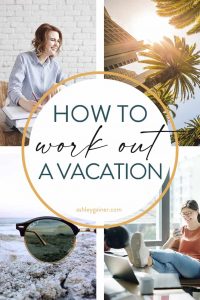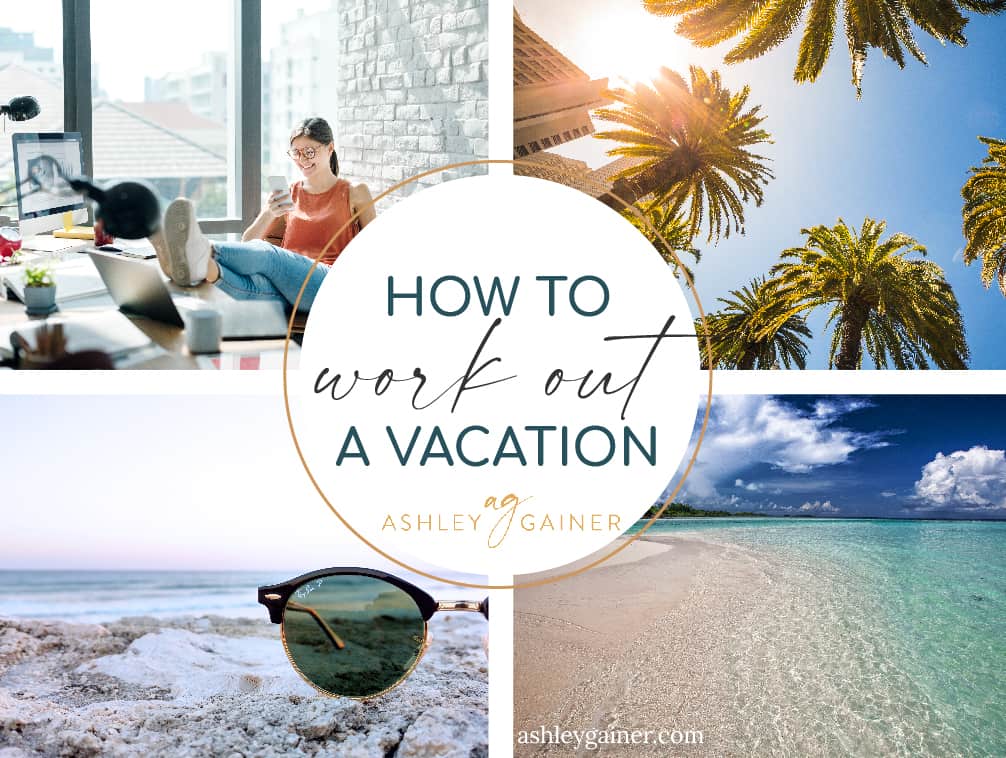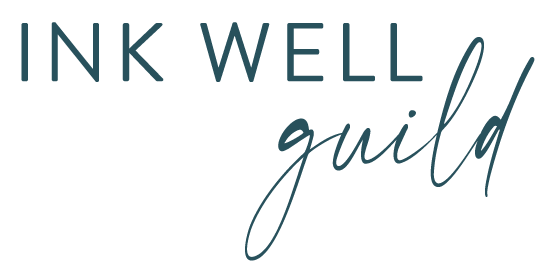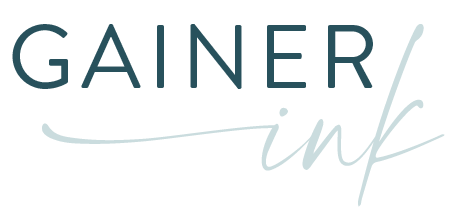A great freelancer benefit is being in charge of your own schedule. But service providers need to prepare before taking a break from work. I’m sharing 7 top tips for working out a vacation for yourself when you’re a freelance service provider, even if it’s a staycation.
Years ago, I wrote this blog post on the same subject: “How To Take A Vacation When You’re A Freelancer“. Some of this may be familiar. However, I’m going to go over my current pointers, because I’ve now used them multiple times since then, and have expanded my business and family.
1. Working or not working?
The first pointer is to decide just how unplugged you plan to be. Is this a working vacation where you cut your hours down to three or four a day and otherwise spend it with your family? Do you plan to bring your laptop on vacation with you? Will you spend time checking in and keeping in touch?
Or is this a complete digital sabbatical where you don’t take your phone and don’t check your email? Or is it somewhere in between? How much do you want or plan to get done?
Only you can make that decision. It’s going to depend in large part on what deadlines you have looming, whether you have a big project coming up, or if you have a regular client with weekly deadlines.
Once you figure out if you want to be working on this trip or not, you’re going to plan and arrange it accordingly. Figure out the amount of work that you’ll be doing. Then you can start to formulate your strategy and execute your plan.
2. Give yourself permission to do “not working”
The second pointer is that it’s okay to not do any work. Give yourself permission to go on a vacation. You are allowed to take time off.
I’d say it’s necessary for you to take time off because when we work for ourselves, the line between “work brain” and “personal brain” gets really blurry. We think about work while we’re cooking. We think about laundry while we’re supposed to be typing. It can be hard to completely detach from your work, because it follows you, and bleeds into your everyday thought process.
If you’re not careful, you will basically always be working, paid or unpaid. So give yourself permission to take the trip, unplug, leave the computer at home, not work.
3. Plan your deadlines around it
The third pointer is to set your deadlines around your vacation. Take your calendar, look at the dates that you want to be away, and decide where to block off and make yourself unavailable for deadlines.
Let’s say I want to take my kids to Disney World. I want to leave on a Saturday and come back the following Saturday. If I’m going to do myself any favors, I won’t set deadlines for the Friday before we leave. Ideally, I won’t set deadlines sooner than Wednesday or Thursday after I get back. That way I’ve given myself a one-day buffer for my deadlines before leaving and a three- to possibly four-day buffer after returning.
So, if somebody wants to set a deadline for that Monday or Tuesday, when I’ll just be back from Disney World, I can tell them in advance, “I’m sorry. I’m not able to do that, but I could have it for you that Wednesday.”
You can turn down work if you need to for your vacation time. Sometimes it’s in your favor to be unavailable. People think that you’re busy (and you are!). Then, people think that you’re valuable, which you also are. When you have a wait list or aren’t immediately available, it signals that your docket is full. That typically signals that you are an in-demand writer.
4. Tell your clients you’ll be unavailable
The fourth pointer is to advise your clients in advance that you’ll be out of touch for your vacation dates. Or, if it’s a working vacation, which days and times you’ll be checking in.
Perhaps you’ll check email on Friday at 5:00 PM, but from that point on until the following Monday you won’t be able to check email, etc. Or tell them you’ll be checking email occasionally, but won’t be able to discuss projects.
Depending on the nature of my relationship with any given client, I like to give at least a couple of weeks notice if I’m taking less than a week off. If I’m going to be away for a week or longer, I like to give them at least three or four weeks notice.
I try to conduct my business in a way that there are no bad surprises for my clients. One of the ways I do that is to give them plenty of notice if I’m going to be unavailable when they are otherwise used to me being pretty available.
5. Give yourself buffers
The fifth pointer is to give yourself buffers, which I touched on in the deadlines section. Give yourself a full day before you leave and at least a full day when you get back to be unavailable.
Your mind will be frantic right before vacation. You’ve got a bunch of pressure built up because there’s last minute stuff to do. There’s also going to be stuff that falls in your lap to take care of before you go, things you hadn’t accounted for.
When you return from vacation, you don’t want to be in a position where you’re jet lagged, exhausted, or just completely fried and have to do creative work right away. (Maybe you need a vacation from your vacation!) You don’t want to roll in at 9:00 Sunday night and have to sit down at 10:00 Monday morning to write some good copy.
It’s difficult to do that for most people. Maybe you’re superhuman, but not me. When I’ve gotten back from a big exhausting trip, ordeal, or illness, it’s been really difficult for me to do any kind of creative work.
Give yourself a day to get reoriented. Clear out your inbox, do some planning and scheduling, and maybe draft, outline, pitch, or whatever to warm yourself up. The next day is when you can start to do some work (but no deadlines yet). If I know I’ll be able to have a nice, smooth re-entry the first day after a vacation, then I can plug right back in to do the work thing again the second day.
Never assume that you’re superhuman. Give yourself a break. Then if you show up and you are superhuman, it’s an awesome surprise. You can take advantage of it, but it’s not something you can count on.
6. Make it fun (and easy) to come back
The sixth pointer is to give yourself an incentive to plug back in after vacation. If there’s some kind of fun project I’ve been looking forward to, I might assign that to myself for that first day back. When I have a little bit of extra time after getting reoriented, I can dig into that fun thing.
Maybe there’s something I’ve been wanting to read, study, or analyze, or maybe it’s creative. It works best for me if it’s a no pressure thing, just something I’m doing for myself or that really taps into my creativity, but doesn’t have a tight deadline attached to it.
Having that fun little thing makes it easier to not have a vacation to look forward to anymore. You’re the boss. You can be nice to yourself and plan fun stuff. Don’t make yourself file your taxes on the day you get home from your vacation–unless you love doing your taxes.
7. Leave yourself clues
The last tip is to leave yourself clues to make it easy to slip back into things. Before you leave on that final day, take an inventory of everything that’s going on and everything that you need to pick back up when you get there.
My business mentor, Julie Chenell, refers to this as a pin drop document. Here’s her blog post: https://juliechenell.com/the-1-thing-that-prevents-overwhelm-at-work-after-being-away-on-vacation-or-leave/.
Her idea is you dropping a pin in your current location before you step away. Then when you come back, you just go to that pin. You’ll know exactly where you are. You’re completely oriented, and you know what to do next.
Being able to unplug is worth it. If you can give yourself that break, you’ll come back energized and refreshed. You’ll probably have a lot of new ideas and some good perspective on what you want your business to do for you and who you want to be as a business owner. When you decide to step away and get some rest, do whatever you can to make it high-quality rest, and high-quality time away.
Clips Camp
Clips Camp is a three-week course for new and advanced new freelance writers who want to get started with high-paid client work.
If you are on Upwork or Fiverr and miserable, or if you haven’t even done anything to get started and you don’t know what the first step is, Clips Camp is for you. I teach you how to put together a solid portfolio of writing samples that position you as the kind of awesome writer that awesome clients want to hire. So if you want more information, go to clipscamp.com!





